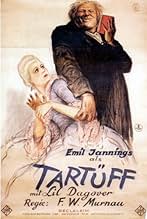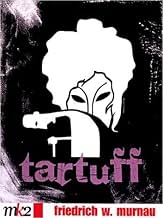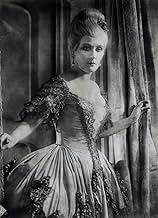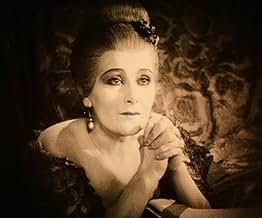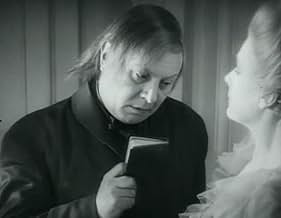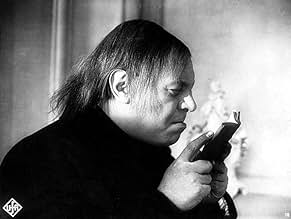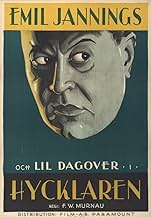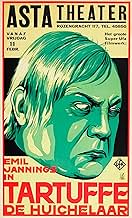NOTE IMDb
7,1/10
2,9 k
MA NOTE
Ajouter une intrigue dans votre langueA young man shows his millionaire grandfather a film based on Molière's Tartuffe, in order to expose the old man's hypocritical governess who covets his own inheritance.A young man shows his millionaire grandfather a film based on Molière's Tartuffe, in order to expose the old man's hypocritical governess who covets his own inheritance.A young man shows his millionaire grandfather a film based on Molière's Tartuffe, in order to expose the old man's hypocritical governess who covets his own inheritance.
- Réalisation
- Scénario
- Casting principal
Avis à la une
When first performed at Versailles in 1664 his play 'Tartuffe' landed Moliere in all sorts of trouble due to its depiction of impiety and religious hypocrisy. Apparently the Archbishop of Paris threatened anyone with excommunication who performed, watched or even read it! It was finally staged with great success in 1669 in the five act version we know today. Obviously humbled by the experience Moliere's satire was never again quite as scathing. The film under review is extremely scathing however and presents Tartuffe in the person of Emil Jannings as a monster of avarice and lechery.Well, nobody's perfect! His true nature is finally revealed and Orgon, played by Werner Krauss is reunited with his wife Elmire, portrayed by Lil Dagover, who had been estranged due to Tartuffe's evil influence. Only these three characters plus Lucie Hoflich as Dorine the housekeeper remain from Moliere's original so this piece cannot be judged as a film of the play. Purely as a film it is exceptionally well made and acted. This is hardly surprising as some of the greatest talents of Weimar cinema are involved. The 'film-within-a-film' concept of the brilliant but ill-fated Carl Mayer is inspired. Director Murnau has once again the services of the superlative Karl Freund behind the camera whilst Walther Rohrig and Robert Herlth contribute their magnificent art direction. It is beyond the power of words of course to define the breadth of Murnau's talent. Werner Krauss is a terrifyingly good actor and makes the most of a pretty thankless part. Although Jannings was dismissed by Dietrich as 'an old ham' it was always, well, nearly always, ham of the finest quality. This is also the first film of the lovely Camilla Horn who is uncredited as Lil Dagover's stunt double! She went on the following year to make her mark as Gretchen in 'Faust' for the same director. 'Tartuffe' is highly recommended for those few who appreciate film as an art form.
The film begins with the story of a rich man being given a slow premature death by his money-grubbing housekeeper. The elderly man has shunned his actor grandson, who visits him and, after discovering the housekeepers use of poison, is sent away. He returns disguised as a travelling cinema worker, who, upon getting into his grandfather's house, proceeds to show them the story of Herr Tartuff. Rich landowner Herr Orgon (Werner Krauss) brings his new friend and religious fanatic Tartuffe (Emil Jannings) home, much to the dismay of Orgon's wife Frau Elmire (Lil Dagover). After she spurns Tartuffe's sexual advances, she sets out to prove to Orgon that Tartuffe is an imposter who is seeking to inherit Orgon's vast estate.
Why director F.W. Murnau decided to use the film-within-a-film device in his adaptation of Moliere's famous play, I'm not sure. Maybe it was to put his own new spin on what is now a well-known story and moral tale, or perhaps it is just to bring it up to date. Either way, it's an effective device, and allows Murnau to advertise his unbelievably advanced film-making techniques and ideas. His better known classics such as Nosferatu (1922) and Sunrise: A Song of Two Humans (1927) showed his ability for expressionism and breakthrough techniques, but Tartuffe displays his eye for the science of cinema. Every frame, every camera movement, and every cut is sheer beauty. And everything is helped by one of the giants of silent cinema, Emil Jannings.
Tartuffe is an absolute monster, and it needed a true monster to play him. Jannings is colossal - his hulking frame making him look like a kind of evil spectre, capable of anything (what a shame that Jannings would later commit career suicide by becoming Goebbels pet propaganda tool). The film takes some surprising risks (for its time) as well. During the opening scenes, before we are introduced to Tartuffe, we see the young grandson being booted out of the house. Then something amazing happens - he walks up to the camera and looks at us, the audience, smiling. He assures us that the matter is not finished, and that he will be back to avenge his grandfather. This was back in a time where directors felt they had to have the characters looking a certain way went conversing, and that camera shots had to be at a certain level, for fear the audience simply wouldn't understand what was happening. Directors were simply terrified to try new techniques, but not Murnau.
There is also a shocking scene involving the first exchanges between Tartuffe and Elmire. She is in the midst of demanding him to leave, when the camera droops down from her face, and lingers on her cleavage, which is slightly visible due to the way she is looking down upon Tartuffe. All is seen from Tartuffe's point of view, and this happens a number of times. Surprisingly saucy given it's age. Murnau is simply a genius, and you can watch almost any of his films to realise this. Tartuffe is not his best, and even if it seems to be breathlessly sprinting for the end in the final ten minutes, it is still a brilliant film.
www.the-wrath-of-blog.blogspot.com
Why director F.W. Murnau decided to use the film-within-a-film device in his adaptation of Moliere's famous play, I'm not sure. Maybe it was to put his own new spin on what is now a well-known story and moral tale, or perhaps it is just to bring it up to date. Either way, it's an effective device, and allows Murnau to advertise his unbelievably advanced film-making techniques and ideas. His better known classics such as Nosferatu (1922) and Sunrise: A Song of Two Humans (1927) showed his ability for expressionism and breakthrough techniques, but Tartuffe displays his eye for the science of cinema. Every frame, every camera movement, and every cut is sheer beauty. And everything is helped by one of the giants of silent cinema, Emil Jannings.
Tartuffe is an absolute monster, and it needed a true monster to play him. Jannings is colossal - his hulking frame making him look like a kind of evil spectre, capable of anything (what a shame that Jannings would later commit career suicide by becoming Goebbels pet propaganda tool). The film takes some surprising risks (for its time) as well. During the opening scenes, before we are introduced to Tartuffe, we see the young grandson being booted out of the house. Then something amazing happens - he walks up to the camera and looks at us, the audience, smiling. He assures us that the matter is not finished, and that he will be back to avenge his grandfather. This was back in a time where directors felt they had to have the characters looking a certain way went conversing, and that camera shots had to be at a certain level, for fear the audience simply wouldn't understand what was happening. Directors were simply terrified to try new techniques, but not Murnau.
There is also a shocking scene involving the first exchanges between Tartuffe and Elmire. She is in the midst of demanding him to leave, when the camera droops down from her face, and lingers on her cleavage, which is slightly visible due to the way she is looking down upon Tartuffe. All is seen from Tartuffe's point of view, and this happens a number of times. Surprisingly saucy given it's age. Murnau is simply a genius, and you can watch almost any of his films to realise this. Tartuffe is not his best, and even if it seems to be breathlessly sprinting for the end in the final ten minutes, it is still a brilliant film.
www.the-wrath-of-blog.blogspot.com
While this film does not have the amazing scenes with breathtaking cinematography like FAUST or SUNRISE, this Murnau film still does excel due to the camera-work and great care taken in its production. And, while not the very best silent film available, it's certainly among the better ones.
This story differs from Molière's play in that the entire play is actually part of a larger story--with a prologue and epilogue. The story begins with a rich old man living alone with his supposedly devoted housekeeper. She has convinced the man that his grandson is evil and should be disinherited because he is, oh, horrors,...an ACTOR!!! Instead, she's fooled him into making her the beneficiary. When the grandson shows up to say hello, the old man chases him away and it appears the housekeeper has won. However, given that the young man is an actor, he dresses up as a traveling showman and comes to the house to show them a film--TARTUFFE.
The film stars Emil Jannings as the evil priest, Tartuffe, who has fooled a rich nobleman into forsaking the pleasures of life and becoming an aesthetic, like him. But, the man's wife soon realizes the priest is a charlatan and much of the movie is spent trying to trap the priest in his lies. Naturally, all this is symbolic of the relationship between the housekeeper and the rich man.
The sets, direction and acting are all excellent. The acting is rather restrained compared to some silent films and the story is told in a brisk and watchable manner.
This story differs from Molière's play in that the entire play is actually part of a larger story--with a prologue and epilogue. The story begins with a rich old man living alone with his supposedly devoted housekeeper. She has convinced the man that his grandson is evil and should be disinherited because he is, oh, horrors,...an ACTOR!!! Instead, she's fooled him into making her the beneficiary. When the grandson shows up to say hello, the old man chases him away and it appears the housekeeper has won. However, given that the young man is an actor, he dresses up as a traveling showman and comes to the house to show them a film--TARTUFFE.
The film stars Emil Jannings as the evil priest, Tartuffe, who has fooled a rich nobleman into forsaking the pleasures of life and becoming an aesthetic, like him. But, the man's wife soon realizes the priest is a charlatan and much of the movie is spent trying to trap the priest in his lies. Naturally, all this is symbolic of the relationship between the housekeeper and the rich man.
The sets, direction and acting are all excellent. The acting is rather restrained compared to some silent films and the story is told in a brisk and watchable manner.
As I've discovered after relatively recent viewings of 'Nosferatu (1922),' 'The Last Laugh (1924)' and 'Faust (1926),' F.W. Murnau was one of the most exciting and influential European directors working during the 1920s. His contributions towards early German cinema are rivalled only by Fritz Lang, and his ability to use lighting and shadows to create atmosphere are almost unparalleled. 'Herr Tartüff / Tartuffe (1926)' was apparently forced upon Murnau by contractual obligations with Universum Film (UFA), and you suspect that perhaps his heart wasn't quite in it, but the end result nonetheless remains essential viewing, as are all the director's films. The story is based upon Molière's successful 1664 play, "Tartuffe," which explored the notion of hypocrisy, particularly among self-proclaimed religious "devotees." Murnau and screenwriter Carl Mayer stripped the story to its bare essentials, removing any extraneous supporting characters and creating a close-knit triangle Herr Orgon, Frau Elmire and Tartüff around which the story revolves. Murnau also added an interesting framing device, whereby the story of Tartuffe becomes a film-within-a-film that a young actor shows to his grandfather to warn of his housekeeper's evil intentions.
Interestingly, I found the story's prologue of the old man and his scheming housekeeper to be a more engrossing story than the film that the characters are later shown. The conniving old woman (Rosa Valetti), with a devilish grin like a Cheshire Cat, manages to convince her senile employer (Hermann Picha) that his grandson has dishonoured the family name by becoming an actor, and so she sets herself up to inherit his entire fortune. When the sincere young actor (André Mattoni) finds out about this betrayal, he plans an ingenious stratagem to outwit the malicious housekeeper and convince his grandfather of her evil. Murnau was obviously a great believer in the power of cinema, and so it's no surprise that the young man chooses the cinematic medium with which to reveal the ultimate truth about hypocrites. The film, by employing a few deceptively simple shots, immediately translates the inner motivations driving each character: the housekeeper, greedy and malevolent, kicks aside her master's slippers, whereas the kind, loving grandson delicately sets them back into place. Also notable is a moment during the narrative when the young actor turns to the camera and addresses the audience directly, one of the earliest instances I've seen of a character "breaking the fourth wall."
The tale of Tartuffe himself is also worth watching for its technical accomplishments, even if the story itself seems somewhat generic and uninteresting. Most astounding is Murnau's exceptional use of lighting {assisted, of course, by cinematographer Karl Freund}, and, in many cases, entire rooms are seemingly being illuminated only by candlelight. This story concerns a happily-married woman, Frau Elmire (Lil Dagover), who is distraught to discover that her beloved husband, Herr Orgon (Werner Krauss), has become obsessed with Tartüff (the great Emil Jannings), a grotesque little man who speaks with divine importance and claims to be a Saint. However hard she tries, Elmire cannot convince Orgon that he has been duped by a religious fraud, so great is the cunning of Tartüffe's deception. In the film, Jannings predictably gives the finest performance, playing the unsavoury title character with a mixture of sly arrogance and lustful repugnance. Nevertheless, the role falls far short of the silent actor's greatest performances, which include Mephisto of 'Faust (1926)' and the hotel porter from 'The Last Laugh (1924).'
Interestingly, I found the story's prologue of the old man and his scheming housekeeper to be a more engrossing story than the film that the characters are later shown. The conniving old woman (Rosa Valetti), with a devilish grin like a Cheshire Cat, manages to convince her senile employer (Hermann Picha) that his grandson has dishonoured the family name by becoming an actor, and so she sets herself up to inherit his entire fortune. When the sincere young actor (André Mattoni) finds out about this betrayal, he plans an ingenious stratagem to outwit the malicious housekeeper and convince his grandfather of her evil. Murnau was obviously a great believer in the power of cinema, and so it's no surprise that the young man chooses the cinematic medium with which to reveal the ultimate truth about hypocrites. The film, by employing a few deceptively simple shots, immediately translates the inner motivations driving each character: the housekeeper, greedy and malevolent, kicks aside her master's slippers, whereas the kind, loving grandson delicately sets them back into place. Also notable is a moment during the narrative when the young actor turns to the camera and addresses the audience directly, one of the earliest instances I've seen of a character "breaking the fourth wall."
The tale of Tartuffe himself is also worth watching for its technical accomplishments, even if the story itself seems somewhat generic and uninteresting. Most astounding is Murnau's exceptional use of lighting {assisted, of course, by cinematographer Karl Freund}, and, in many cases, entire rooms are seemingly being illuminated only by candlelight. This story concerns a happily-married woman, Frau Elmire (Lil Dagover), who is distraught to discover that her beloved husband, Herr Orgon (Werner Krauss), has become obsessed with Tartüff (the great Emil Jannings), a grotesque little man who speaks with divine importance and claims to be a Saint. However hard she tries, Elmire cannot convince Orgon that he has been duped by a religious fraud, so great is the cunning of Tartüffe's deception. In the film, Jannings predictably gives the finest performance, playing the unsavoury title character with a mixture of sly arrogance and lustful repugnance. Nevertheless, the role falls far short of the silent actor's greatest performances, which include Mephisto of 'Faust (1926)' and the hotel porter from 'The Last Laugh (1924).'
This is the fourth Murnau i've seen, after Nosferatu, Sunrise and Faust. I admire the work of Murnau for it's beautiful compositions an camera movement. Murnau is able to translate the mood he want's to set into composition and movement without being artsy for the sake of it.
Tartuffe has quiet a story behind it. Apparently, Murnau was forced by contract to make this film. So this film is to Murnau what Spartacus was to Kubrick. Even though it's still a Murnau picture: again Murnau knows how to give a quiet flat story more depth by suggestion and style. I liked the film, it's hasn't got the outdoors scene's that Sunrise and Nosferatu had, or the huge sets and special effect of Faust, but still it remains an exciting film. Don't hold back by the negative reviewers of the film, this is, by all means, not a bad film. It's just that Murnau made so much breathtaking stuff in his other work, that this film seems not so historical interesting. But if you're a fan of Murnau's other work I'm sure you'll like this as well. Make sure you'll watch the Masters of Cinema edition. It has a great documentary about the making of this film. It gave me a lot of new insights about the film and about Murnau.
Tartuffe has quiet a story behind it. Apparently, Murnau was forced by contract to make this film. So this film is to Murnau what Spartacus was to Kubrick. Even though it's still a Murnau picture: again Murnau knows how to give a quiet flat story more depth by suggestion and style. I liked the film, it's hasn't got the outdoors scene's that Sunrise and Nosferatu had, or the huge sets and special effect of Faust, but still it remains an exciting film. Don't hold back by the negative reviewers of the film, this is, by all means, not a bad film. It's just that Murnau made so much breathtaking stuff in his other work, that this film seems not so historical interesting. But if you're a fan of Murnau's other work I'm sure you'll like this as well. Make sure you'll watch the Masters of Cinema edition. It has a great documentary about the making of this film. It gave me a lot of new insights about the film and about Murnau.
Le saviez-vous
- AnecdotesCamilla Horn served as Lil Dagover's foot double in this film. This small role effectively launched her lengthy acting career, as she was noticed by director F.W. Murnau and cast as the lead actress in his film, Faust, une légende allemande (1926).
- Versions alternativesThis film was published in Italy in an DVD anthology entitled "Il castello di Vogelod", distributed by DNA Srl. The film has been re-edited with the contribution of the film history scholar Riccardo Cusin . This version is also available in streaming on some platforms.
- ConnexionsFeatured in Dämonische Leinwand - Der deutsche Film der zwanziger Jahre (1998)
Meilleurs choix
Connectez-vous pour évaluer et suivre la liste de favoris afin de recevoir des recommandations personnalisées
Détails
- Durée1 heure 14 minutes
- Couleur
- Mixage
- Rapport de forme
- 1.33 : 1
Contribuer à cette page
Suggérer une modification ou ajouter du contenu manquant


